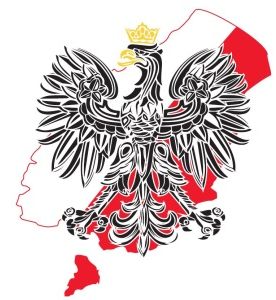The Polish Heritage of Otago and Southland Charitable Trust (POHOS)
 Established 16th November 1998
Established 16th November 1998
NZ Companies Office Certificate of Incorporation No 915548
Charitable Commission Registration No CC31359
Winner of Trust Power Dunedin Community Award
Heritage & Environment Section in 2001 and 2007
www.facebook.com/polesdownsouth
www.polesdownsouth.wordpress.com
Chairperson’s Report for the Period Ending 31st of March 2020
On behalf of the Board, I am pleased to present my Annual Report on the activities of the Trust which took place during the last 12 months. These activities benefited the local and wider New Zealand communities in many ways, while we were working steadily, towards focusing on our Trust’s objectives, specifically:
- Enriching New Zealand society by promoting cultural and spiritual awareness of Polish heritage in New Zealand
- Supporting the maintenance of historical properties of Polish heritage in New Zealand
- Co-operation with other historical trusts and organizations
- Supporting and encouraging cultural, educational and economic links and exchanges between Poland and New Zealand
This year the following events took place:
April – May 2019
POHOS celebrated 120 years of the Historic Polish Church build in Waihola in 1899.
The Church originally named after St.Hyacinth was consecrated on April16, 1899. The original parishioners and builders of the church were Polish settlers. It was moved from Waihola to its present location in Broad Bay on the Otago Peninsula after a decision from the Catholic diocese, and renamed Mary Queen of Peace Church in 1848.

Our historian, Paul Klemick presented the history of the church and its relocation from Waihola to Broad Bay. As a sign of remembrance of the first Polish settlers to Otago, he gifted a painting on glass by a Kociewian artist, the very area from which the Polish settlers came
Easter Sunday Mass and the 120th anniversary of St.Hyacinth coincided this year. The birthday mass was officiated by the newly ordained Dunedin Diocese’s Bishop, the Most Reverend Michael Dolley. Honorary Polish Consul for the South Island, Winsome Dormer from Christchurch and Dunedin Councillor Christine Garey were amongst numerous attendees.
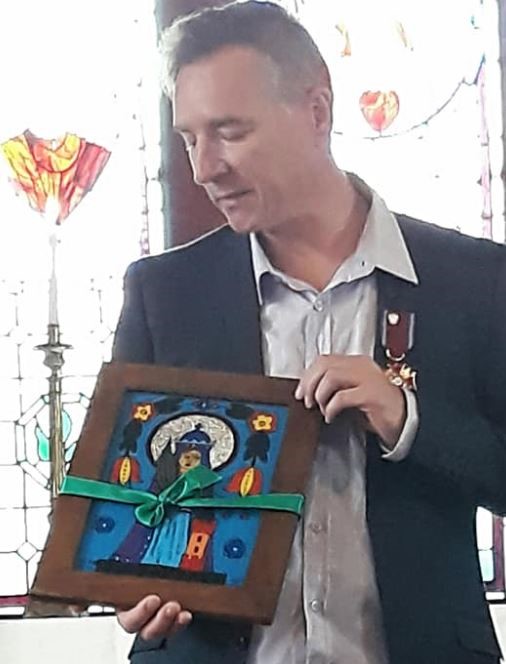
![]()
Easter Mass was followed not only by traditional tea with Polish Easter “Mazurki”, but also we would never miss an opportunity to celebrate with an appropriate cake.
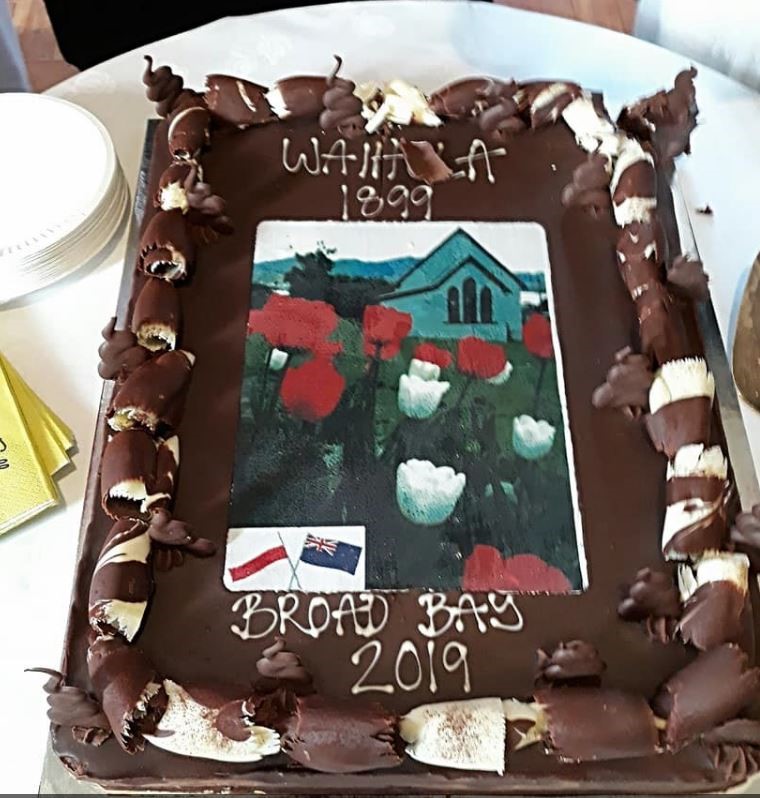
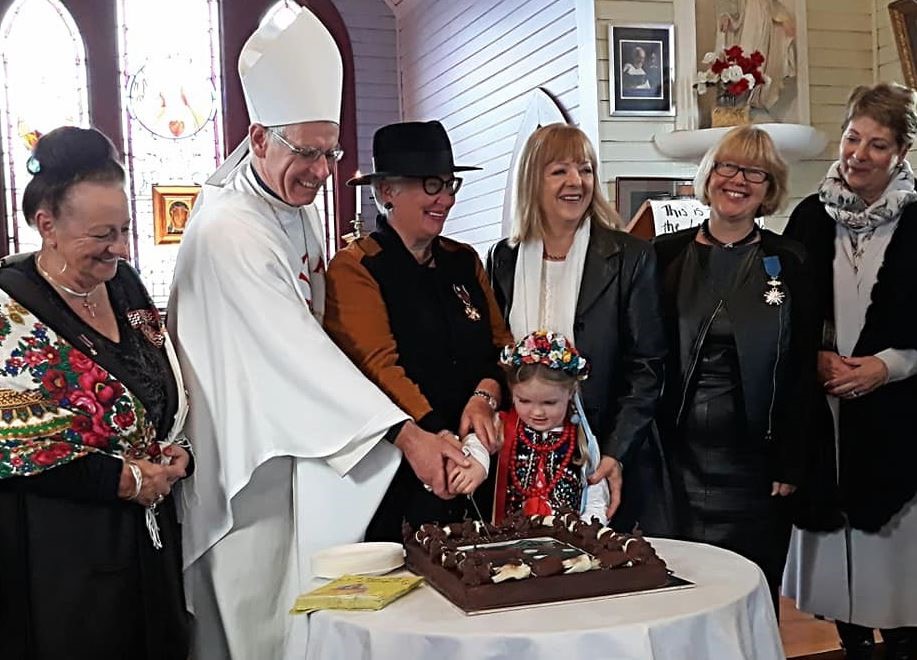
![]()


Behind the scenes Board Members with their helpers where working on repairs on the back of the Church. The back doors were overhauled and new locks were fitted. At the front a new board, explaining the history of Mary Queen of Peace Church, was installed. It was not an easy task as the polls had to be dug in and secured.
Thank you Corran Munro & Alastair McLaren.
![]()
The day before Easter & Anniversary Celebrations Dunedin’s Polish community received a long awaited “birthday present”: Dunedin city Councillors voted to add two new street names “Pomerania” and “Polish Settlers”, recognising the city’s Polish settlers, to the road registry. Very special thanks to Anna McCreath Munro for her tireless campaign.
![]()
3th of May, Polish National Day
The Constitution of 3 May 1791 for the Polish-Lithuanian Commonwealth combined a monarchic republic with a clear division of executive, legislative and judiciary powers. It is generally considered Europe’s first, and the world’s second, modern national constitution, after the United States Constitution that had come into force in 1789. Constitution sought to implement a more effective constitutional monarchy, introduce political equality between townspeople and nobility, placed the peasants under protection of the government, mitigating the worst abuses of serfdom. It banned pernicious institutions such as liberum veto. Unfortunately it was in force for less than 19 months as its reformative and progressive thinking fell foul of the Commonwealth’s neighbours. King Frederick William II broke Prussia’s alliance with the Polish-Lithuanian Commonwealth and joined forces with Catherine the Great’s Imperial Russia to defeat the Commonwealth in the Polish-Russian War of 1972. This lead to the Second Partition of Poland followed by the Third in 1795 when Poland lost independence for 123 years.
POHOS Board was well represented at the celebrations hosted by His Excellency Polish Ambassador Zbigniew Gniatkowski and Polish Counsul Agnieszka Kacperska
From the left: Krzysztof Dzikiewicz (POHOS), Anna McCreath Munro (POHOS), Zbigniew Gniatkowski (Ambassador), Ewa Rozecka-Pollard (POHOS), MP David Parker, Cecylia Klobukowska (POHOS).
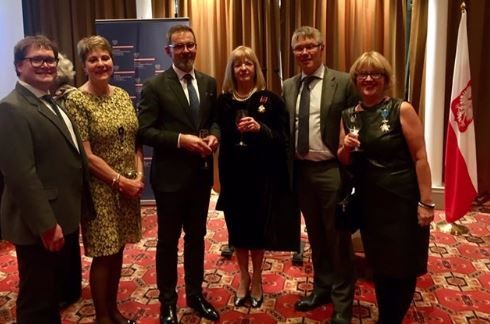
![]()
June – July – August 2019
15th Anniversary of Poland joining European Union
Poland has been a member state of the European Union since 1 May 2004. The actual process of integrating Poland into the EU began with Poland’s application for membership in 1994. Poland worked very hard to turn around the economy, tighten up its post communist rules and regulations in line with EU requirements. I just give you a couple examples:
- Rampant inflation in early 1990s made Polish zloty practically worthless. Just a little personal anecdote to illustrate this. I made my husband a millionaire by giving him as a birthday present a 1,000,000.00zl banknote (it was equivalent of $60.00). Thus on 1 January 1995 the Polish Zloty underwent redenomination at the rate 10,000 to 1.
- One of the EU principles was that the VAT (GST) regime must be implemented by each member state. VAT was first introduced in Poland in July 1993 in anticipation of application for membership of EU. At the time I was working in Poland as a Consultant and believe me this caused absolute chaos as computer programmes and Polish bureaucracy were not able to cope with the new regulations.
After officially joining the EU in 2004 Poland never looked back. According to the survey conducted in March 2014 the Polish presence in the European Union was supported by 89% of Poles. For Poland and many other Central-Eastern European countries joining European Union was a significant step in moving from the shadow of the Iron Curtain to the standard of the Western Europe.
![]()
To celebrate the 15th Anniversary of Poland joining the European Union POHOS financed and supported by the European Union in New Zealand and the Polish Embassy in Wellington organised an ESSAY COMPETITION for Senior High School Students in Otago & Southland (year 11 to 13). The competition presented the perfect opportunity for students interested in politics, diplomacy, government policy, and international development, etc.
 The Essay Competition was the idea of Krzysztof Dzikiewicz and he was singularly in charge of its organisation starting from liaison with the EU Delegation, designing posters, finding the right contacts to reach dozens of schools, taking part in lectures and meetings between students and EU Delegates.
The Essay Competition was the idea of Krzysztof Dzikiewicz and he was singularly in charge of its organisation starting from liaison with the EU Delegation, designing posters, finding the right contacts to reach dozens of schools, taking part in lectures and meetings between students and EU Delegates.
A special page on the PolesDownSouth website was created which further detailed information about the competition.
In response a stack of high quality essays were received.
Thank you Lisa Warrington for reading the presented material and preparing recommendations to the panel of judges.
The panel of judges chose five winners from three different schools, from Dunedin, Invercagill and Queenstown. The following prizes were awarded sponsored by the EU Commission, the Polish Embassy and POHOS:
1st prize –
- $100 book voucher
- Shadowing the EU Ambassador and his team for a day in Wellington including
- Return flights to Wellington from either Invercargill or Dunedin
- Attending VIP meetings (e.g. NZ Ministers, diplomats)
- Airport pick-up and drop-off
- Restaurant lunch went to
Sophie Woodham from Columba College, Dunedin
2nd prize
- $100 book voucher went to 2 winners:
Libby Haywood from Southland Girls’ High School, Invercargill
and
Abby Bowmar from Columba College, Dunedin
3rd prize
- $75 book voucher went to 2 winners:
Jasmine Crighton from Wakatipu High School Queenstown, Queenstown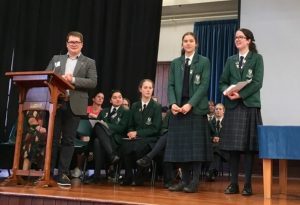
and
Emma Knowler from Southland Girls’ High School, Invercargill
Krzyszfor Dzikiewicz presented the prizes to Sophie and Abbey (pictured on the right) in Columba College.
Krzysztof, thank you and everybody else involved in this successful project.
![]()
October – November 2019
Annual Exhibition in the Community Centre Gallery
The “Women of Independence” Exhibition was officially opened on November 11th exactly on Polish National Independence Day commemorating the anniversary of the restoration of sovereignty in Poland after 123 years of partitions.
The Exhibition, “Women of Independence” (“Kobiety Niepodleglosci”) illustrates the magnitude of the changes in the social role of women during the Polish fight for independence over the last 200 years.
The social roles of women in the 18th & 19th centuries were closely focused around the home and the family. The loss of independence and the subsequent period of wars and national insurrections violated this traditional role division. Some women decided to take an active part in the struggle for independence and later in the suffrage movement.
Our exhibitions always feature two stories the Polish and the New Zealand version of things and this year alongside the brave and outstanding Polish women we learn about New Zealand’s suffrage movement, from the display supplied to us by Heritage New Zealand, Pouhere Taonga Otago-Southland Area Office.
Here are just a few examples from our display:
Emilia Plater – participant in the 1830 uprising. Having disguised her gender, she headed a fighting squad in present-day Lithuania
Eliza Orzeszkowa – the writer exposing womens plight.
Maria Skodowska-Curie – recipient of 2 Nobel prizes and first female professor at the Sorbonne
Anna Tomaszewicz-Dobrska – first Polish woman to obtain a medical diploma
Janina Lewandowska – a pilot and lieutenant in the Polish army, captured by the Soviets and shot in the Katyn Forest massacre in April 1940.
Irena Sandler – worked in the Warsaw City Hall together with the support of her staff she managed to illegally move over 2 thousand Jewish children from the ghetto.
Anna Walentynowicz – a forewoman in the Gdansk Shipyard, in the 1980s she was tried and was imprisoned for her opposition activities.
The Exhibition was officially opened by Dunedin Deputy Mayor Christine Garey and Anna McCreath Munro read a speech on behalf of the Polish Ambassador.
The venue met with a very positive reception and enjoyed a steady stream of visitors during the week.
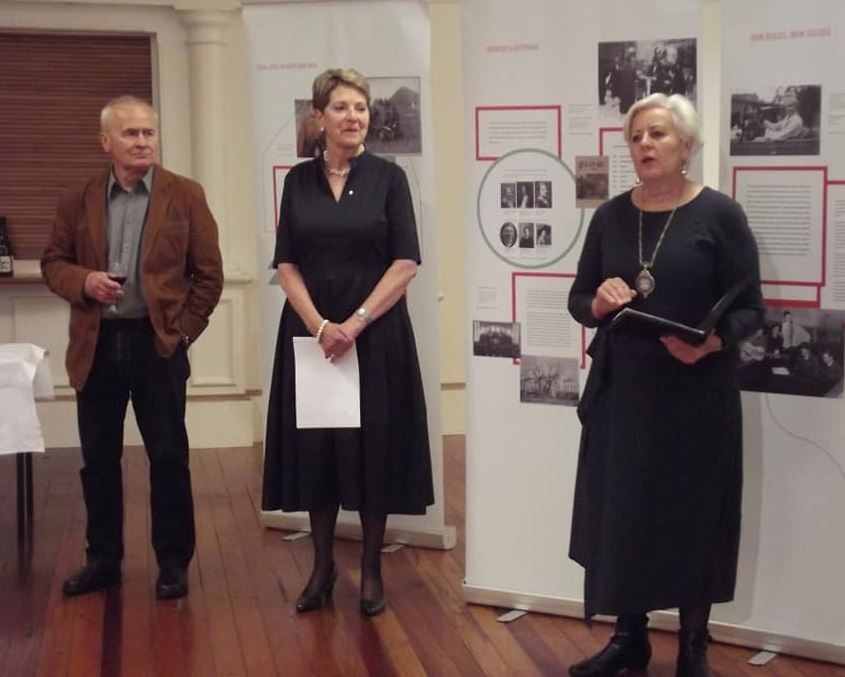
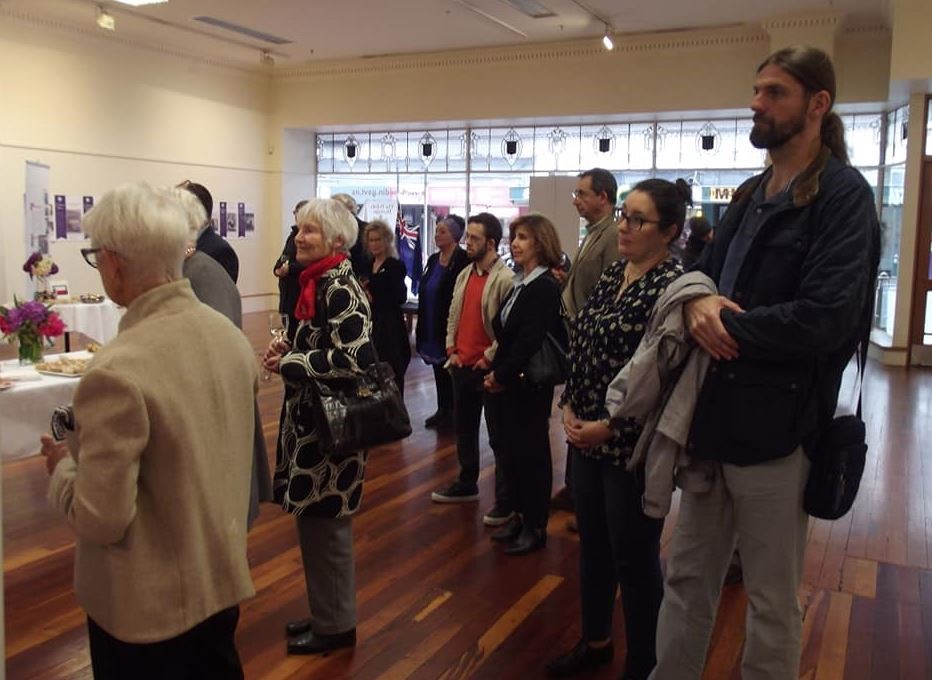
![]()
Restoration of Prince Alois Konstantine Drucki-Lubecki grave stone
The “Drucki-Lubecki” project initiated by POHOS and partly financed by the Polish Embassy in Wellington took more than a year to complete.
On November 12, 2019 the restored grave in the Southern Cemetery was officially blessed and consecrated by the Catholic Bishop of Dunedin, the Most Rev Michael Dooley. The ceremony was attended by the Polish Ambassador to New Zealand, Zbigniew Gniatkowski and board members of POHOS.
Here is quick pictorial history

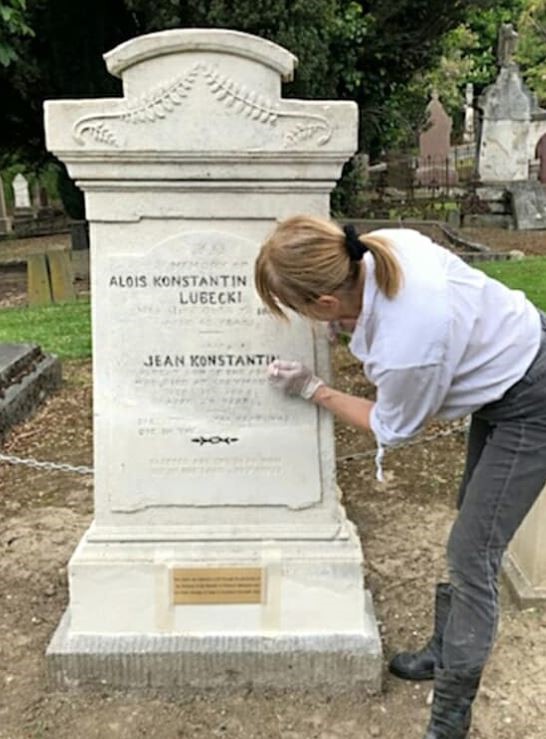
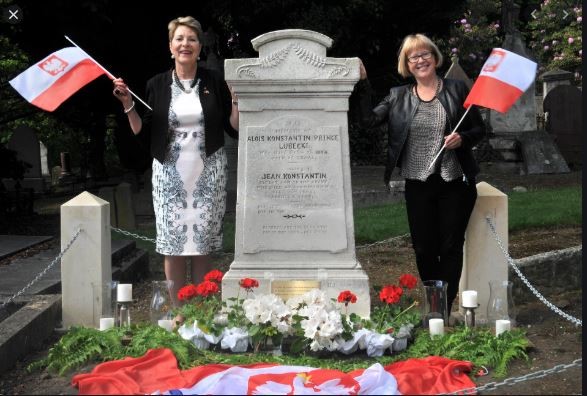
Prince Alois Konstantin Drucki-Lubecki was a descendant of Prince Rurik, dating back to 9th century. Prince Alois had experienced great changes of fortune, having once lived in palaces but later occupying a humble cottage on the corner of Union and George Streets. He had been stripped of all his large estates in eastern Poland after he had supported the 1830 November uprising which sought to create an independent Polish state. He managed to escape from occupied Poland after the uprising and travelled via Saxony and England to Australia and then New Zealand.
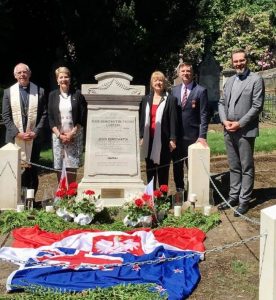
Alois Duffus Lubecki Jr joined the family in Dunedin in 1874 and assumed a position at the Telegraph office where he worked for 30 years. As a result of Alois Duffus Lubecki’s generosity, students intending to pursue a masters degree in applied sciences can apply for the scholarship established in his name in 1924 at the University of Otago.
From the left
Most Rev Bishop of Dunedin Micheal Dooley, Anna McCreath Munro, Ewa Rozecka-Pollard, Paul Klemick,His Excellancy the Polish Ambassador Zbigniew Gniatkowski
![]()
December 2019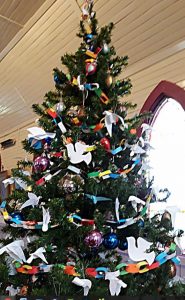 Christmas Carols, Tuesday, 10th of December
Christmas Carols, Tuesday, 10th of December
Our traditional Christmas Carols event at Broad Bay Church as usual, attracted a large crowd from the Broad Bay community, and Polish and international communities. Carols are sung in 7 languages. Music, friendship, food, reflection and a lot of laughter, so much more than just singing Carols.
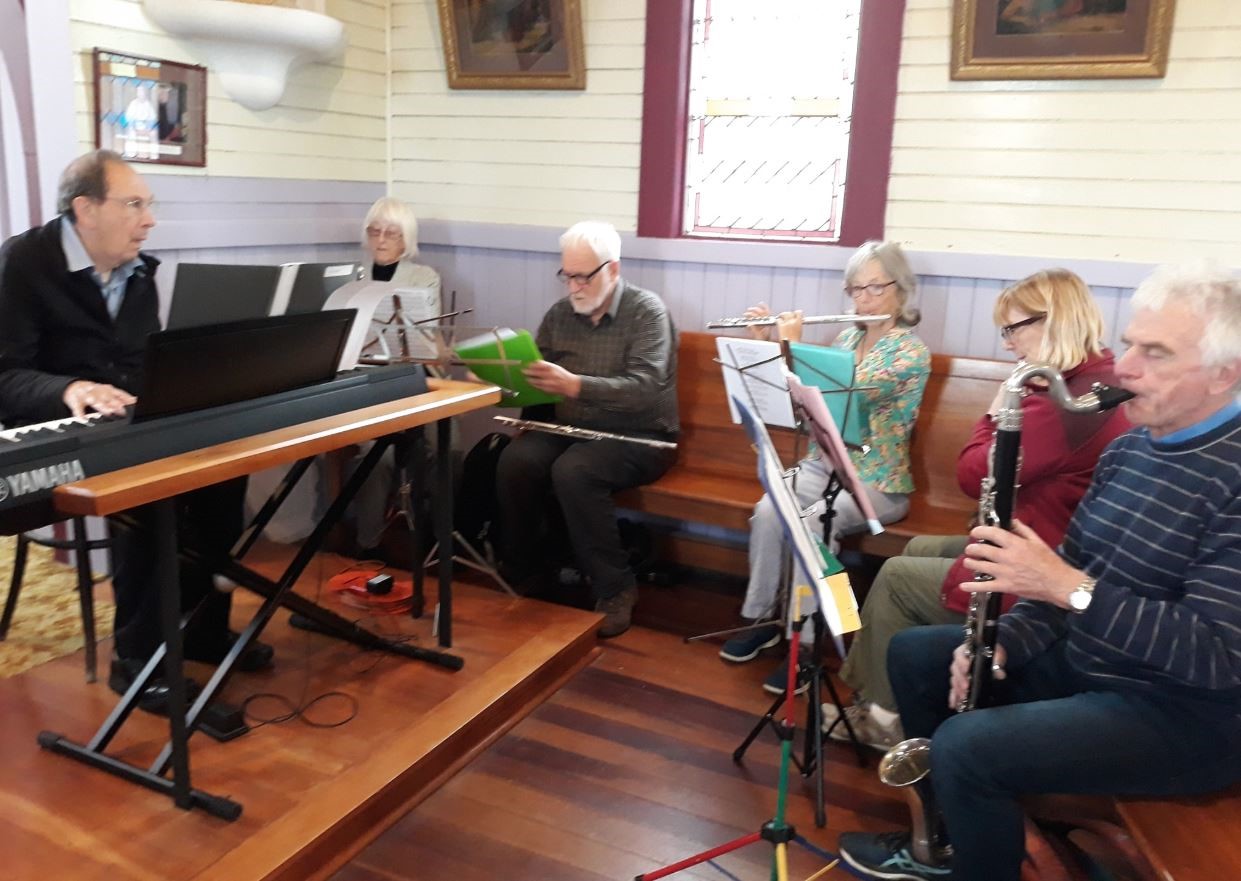
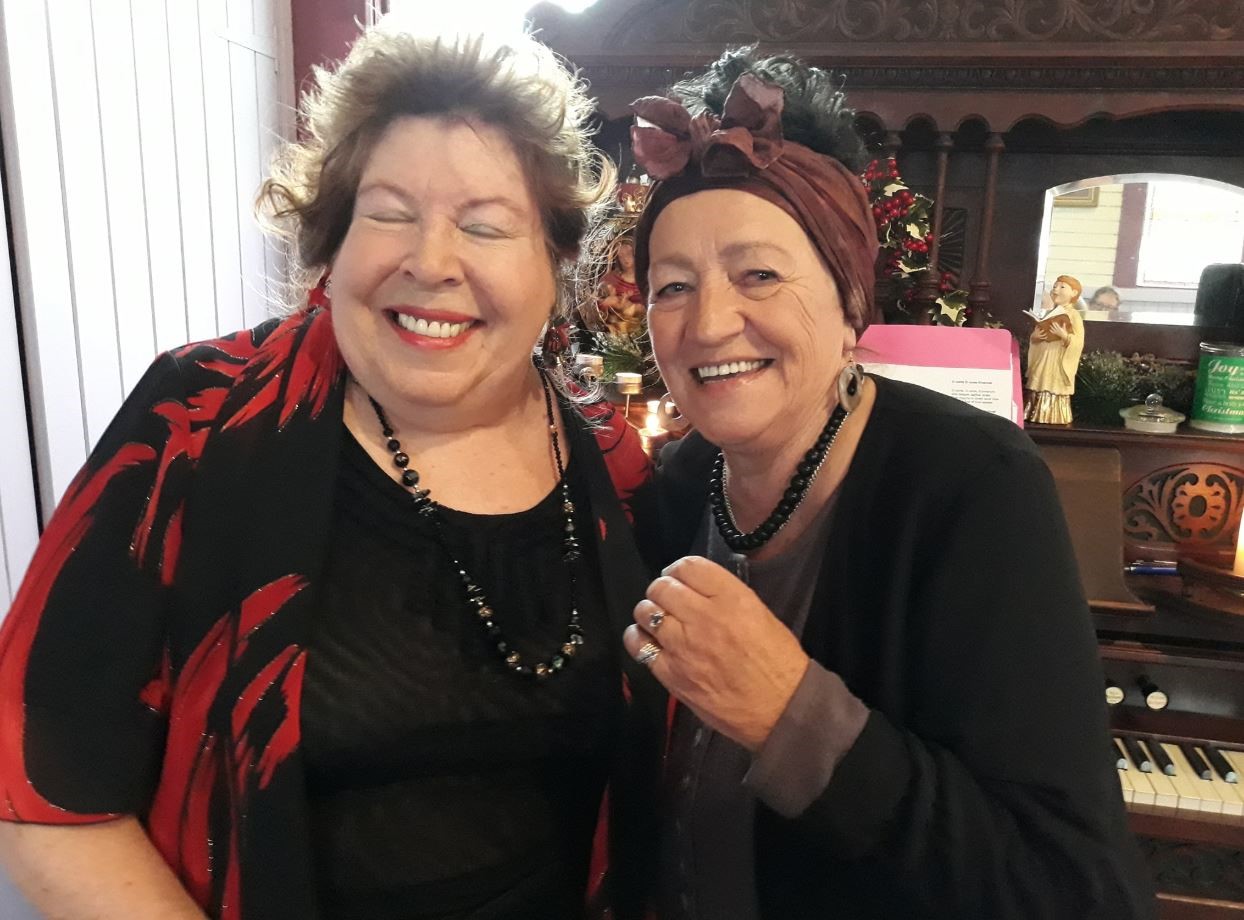
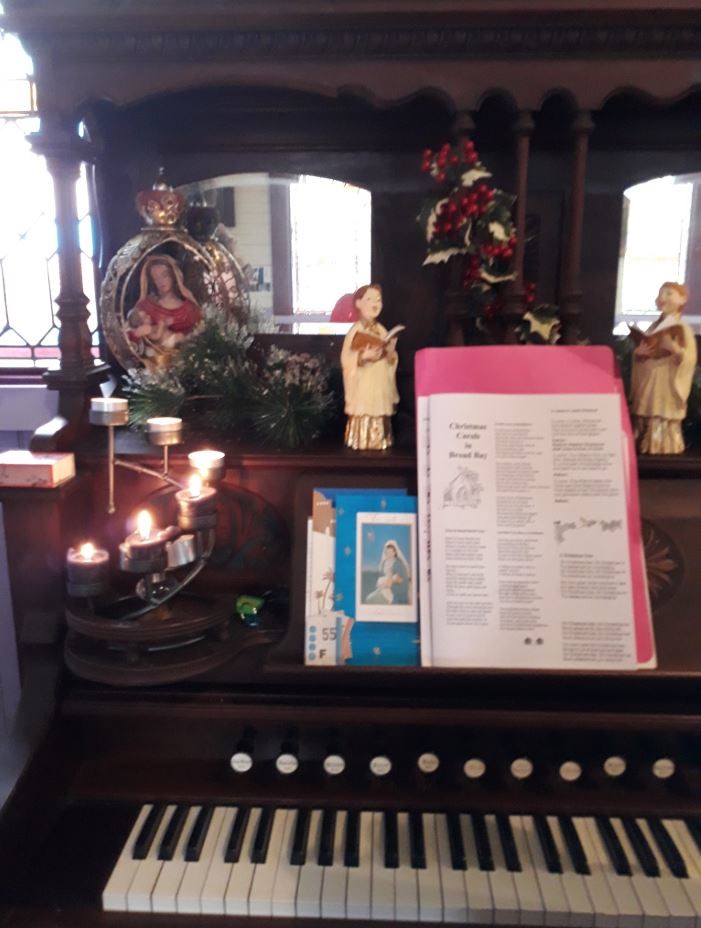
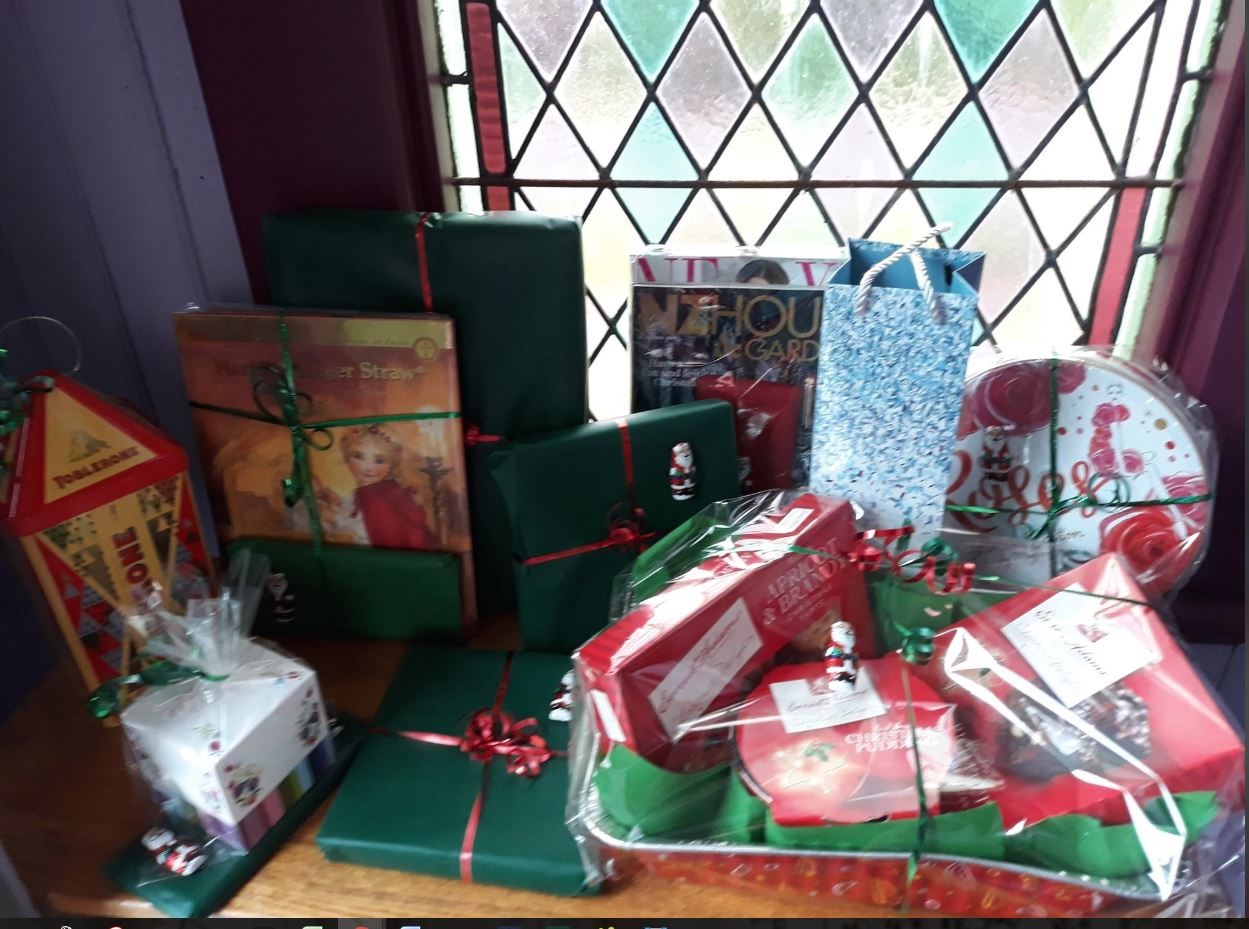
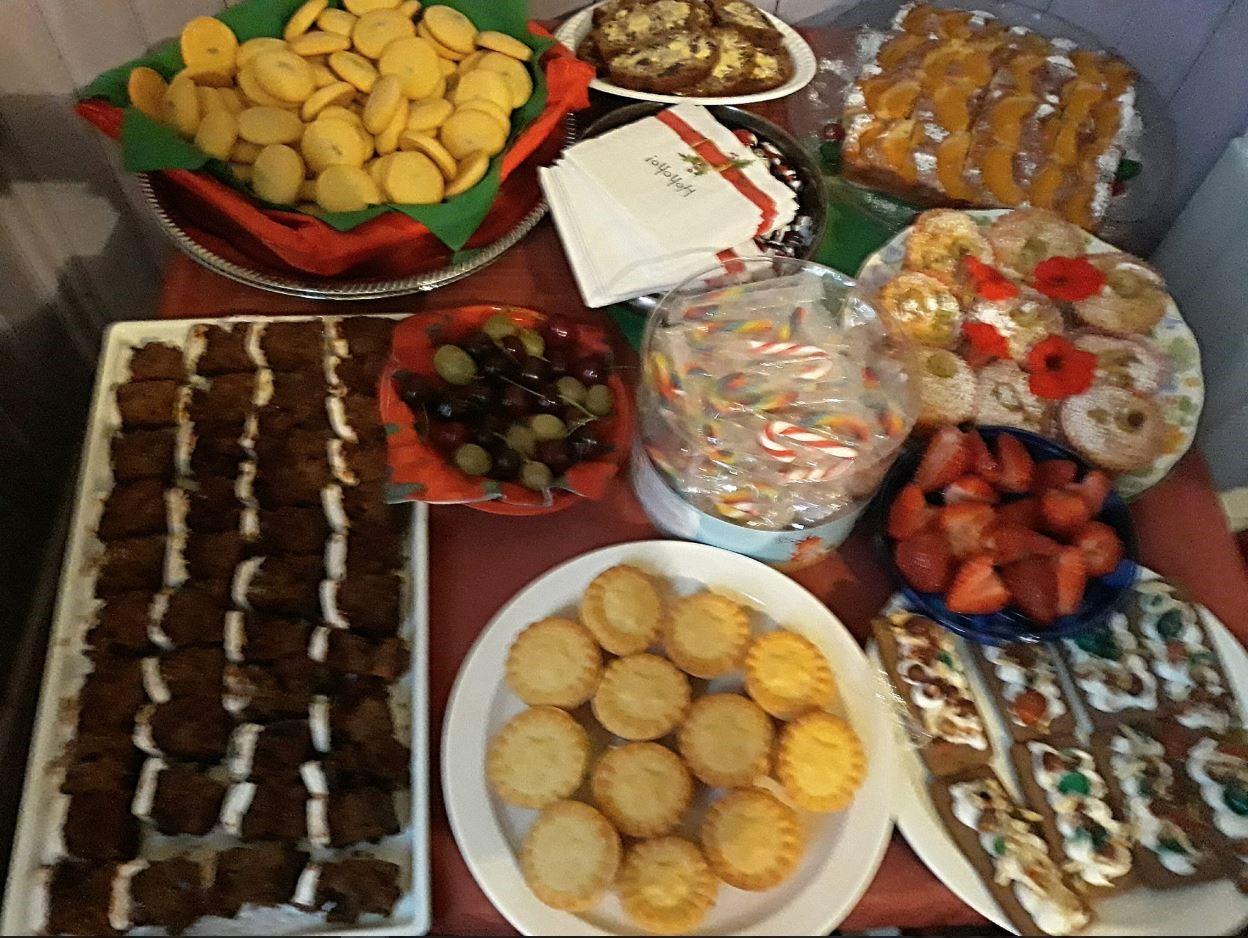






Future projects and work in progress:
From the later part of 2019 the Board began to discuss preparations for two large projects:
- Celebrations of 150th Anniversary of the arrival of the Polish Settlers in New Zealand
- Filming a documentary about a history of Polish Settlers in New Zealand as a joint venture with Toitu Otago Settlers Museum lead by Sean Brosnahan.
Unfortunately events out of our control, COVID-19, is forcing us to change some of our plans, but not all:
- Website is still a ‘work in progress’ but is up and running and most of Paul Klemick’s incredible work on the genealogy of Polish Settlers is there for everybody to see
- Facebook was and is impeccably maintained by Bozena Haug, with tons and tons of current announcements, interesting material, pictures and fun information
- Campaign to expand our Membership
- Annual Exhibition at the Community Centre in November 2020. We have already booked the venue to celebrate the 210th birthday anniversary of Fryderyk Chopin, but due to COVD-19 we are not sure if we will be able to receive suitable materials from Poland in time. The Board will make a decision, in early August, if to change the theme.
- We are going to go ahead with the celebrations of the 150th Anniversary of arrival of Polish Settlers Project and at our next Board Meeting in August a decision is going to be made as to the composition of the Sub-committee in charge.
![]()
I would like to acknowledge the support we received from:
- The Toitu Otago Settlers Museum
- The Broad Bay community and especially Marybeth Mitchell, Bernadette Newlands and Sam Neill.
- The Polish Embassy in Wellington and especially the Polish Ambassador to New Zealand, Zbigniew Gniatkowski
- The Honorary Polish Consul for the South Island and Honorary Member of POHOS Winsome Dormer from Christchurch
- All the members and friends of the Polish heritage of Otago and Southland Trust specifically:
- Anna McCreath Munro for her relentless work as POHOS Secretary
- Krzysztof Dzikiewicz for so successfully organizing EU Competition
- Bozena Haug for the sterling work on our Facebook
- Paul Klemick for his work on our website
- Bernadette Newlands, Cecylia Klobukowska, Marybeth Mitchell and others for cleaning and preparing Broad Bay Church for our monthly mass and decorating it for all the other celebrations.
- Peter Tait for spending every minute of his free time over last 3 months setting up our website: polesdownsouth.org.nz
- Lastly, but not least, a heartfelt thank you to the families of our board members, who stood by us, actively and physically helping us with our projects.
Finally, my great gratitude goes to the current POHOS Board members
- Secretary, Anna McCreath Munro
- Treasurer, Carolina Meikle
- Lisa Warrington
- Krzysztof Dzikiewicz
- Paul Klemick
- Bozena Haug and
- Cecylia Klobukowska
Krzysztof Dzikiewicz stepped down from the board in March 2020. We must thank him for all his hard work throughout the years as a Board Member. We wish him all the best and we are sure he will support us and participate in our enterprises from membership level.
I am very proud of the Trust’s considerable achievements as a result of hard, conscientious and totally voluntary work of all Members of the Board and the Polish Community.
I look forward to the year 2020/2021.
Thank you,
Ewa Rozecka-Pollard
Recipient of Gold Cross of Merit of the Republic of Poland
Chairperson
Polish Heritage of Otago and Southland Charitable Trust
16th July 2020, Dunedin New Zealand
Chairperson ..... Ewa Rożecka Pollard
Phone ......+64 3 477 5552
Secretary ..... Anna McCreath Munro
Phone ..... +64 3 464 0053
Facebook ..... Poles Down South
Contact Poles Down South
Poles in New Zealand We would like to hear from Poles or people with any Polish connection, who visited New Zealand and particularly those of you who paid a visit or lived anywhere in Otago or Southland.
....................
Polski “Poles Down South” jest stroną internetową organizacji polonijnej w Nowej Zelandii działającej w rejonie Otago i Southland na Wyspie Południowej. Siedzibą organizacji jest Dunedin.
